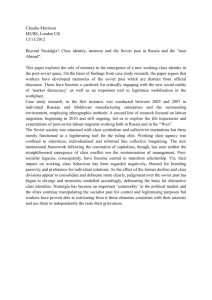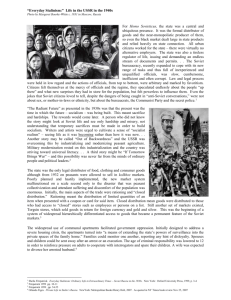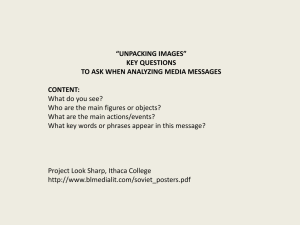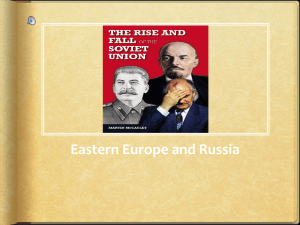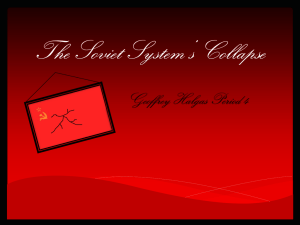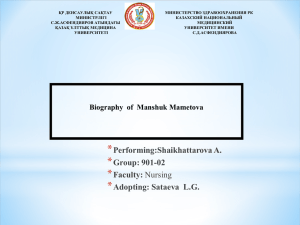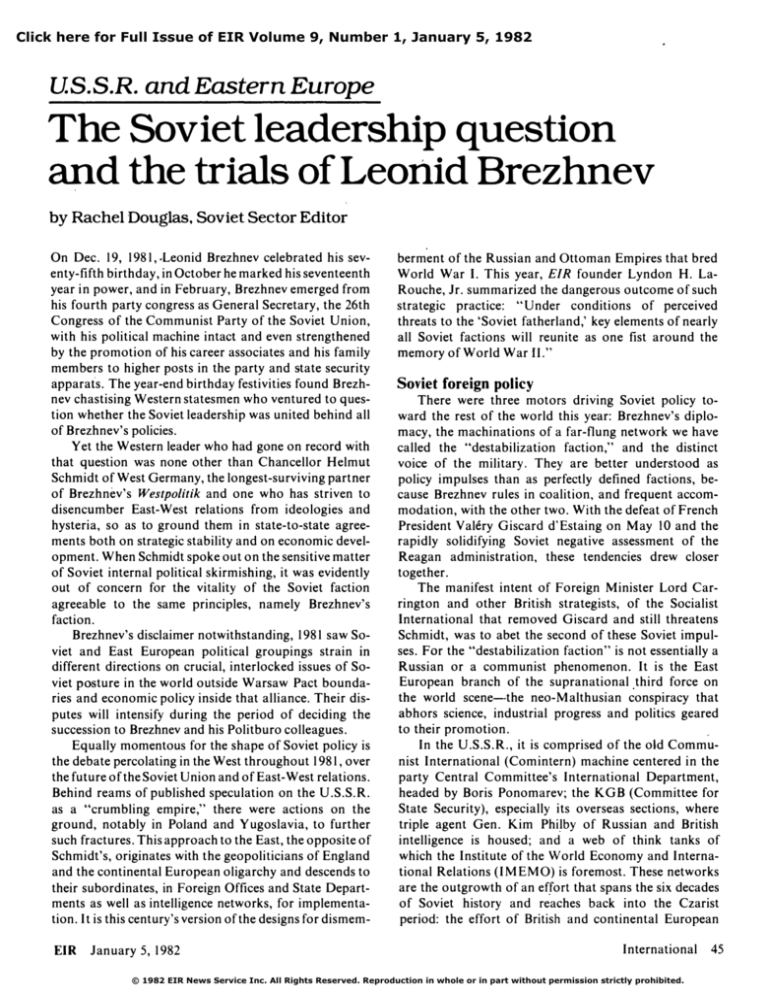
Click here for Full Issue of EIR Volume 9, Number 1, January 5, 1982
US.S.R. and Eastern Europe
The Soviet leadership question
and the trials of Leonid Brezhnev
by Rachel Douglas, Soviet Sector Editor
On Dec. 19, 198 1, .Leonid Brezhnev celebrated his sev­
berment of the Russian and Ottoman Empires that bred
enty-fifth birthday, in October he marked his seventeenth
World War I. This year, EIR founder Lyndon H. La­
year in power, and in February, Brezhnev emerged from
Rouche, Jr. summarized the dangerous outcome of such
his fourth party congress as General Secretary, the 26th
strategic
Congress of the Communist Party of the Soviet Union,
threats to the 'Soviet fatherland,' key elements of nearly
with his political machine intact and even strengthened
all Soviet factions will reunite as one fist around the
by the promotion of his career associates and his family
memory of World War 11."
practice:
"Under
conditions
of
perceived
members to higher posts in the party and state security
apparats. The year-end birthday festivities found Brezh­
nev chastising Western statesmen who ventured to ques­
tion whether the Soviet leadership was united behind all
of Brezhnev's policies.
Yet the Western leader who had gone on record with
that question was none other than Chancellor Helmut
Soviet foreign policy
There were three motors driving Soviet policy to­
ward the rest of the world this year: Brezhnev's diplo­
macy, the machinations of a far-flung network we have
called the "destabilization faction," and the distinct
voice of the military. They are better understood as
Schmidt of West Germany, the longest-surviving partner
policy impulses than as perfectly defined factions, be­
of Brezhnev's Westpolitik and one who has striven to
cause Brezhnev rules in coalition, and frequent accom­
disencumber East-West relations from ideologies and
modation, with the other two. With the defeat of French
hysteria, so as to ground them in state-to-state agree­
President Valery Giscard d'Estaing on May to and the
ments both on strategic stability and on economic devel­
rapidly solidifying Soviet negative assessment of the
opment. When Schmidt spoke out on the sensitive matter
Reagan administration, these tendencies drew closer
of Soviet internal political skirmishing, it was evidently
together.
out of concern for the vitality of the Soviet faction
The manifest intent of Foreign Minister Lord Car­
agreeable to the same principles, namely Brezhnev's
rington and other British strategists, of the Socialist
International that removed Giscard and still threatens
faction.
Brezhnev's disclaimer notwithstanding, 198 1 saw So­
Schmidt, was to abet the second of these Soviet impul­
viet and East European political groupings strain in
ses. For the "destabilization faction" is not essentially a
different directions on crucial, interlocked issues of So­
Russian or a communist phenomenon. It is the East
viet posture in the world outside Warsaw Pact bounda­
European branch of the supranational third force on
ries and economic policy inside that alliance. Their dis­
the world scene-the neo-Malthusian conspiracy that
putes will intensify during the period of deciding the
abhors science, industrial progress and politics geared
succession to Brezhnev and his Politburo colleagues.
to their promotion.
Equally momentous for the shape of Soviet policy is
"
In the U.S.S.R., it is comprised of the old Commu­
the debate percolating in the West throughout 198 1, over
nist International (Com intern) machine centered in the
the future of the Soviet Union and of East-West relations.
party Central Committee's International Department,
Behind reams of published speCUlation on the U.S.S.R.
headed by Boris Ponomarev; the KGB (Committee for
as a "crumbling empire," there were actions on the
State Security), especially its overseas sections, where
ground, notably in Poland and Yugoslavia, to further
triple agent Gen. Kim Philby of Russian and British
such fractures. This approach to the East, the opposite of
intelligence is housed; and a web of think tanks of
Schmidt's, originates with the geopoliticians of England
which the Institute of the World Economy and Interna­
and the continental European oligarchy and descends to
tional Relations (IMEMO) is foremost. These networks
their subordinates, in Foreign Offices and State Depart­
are the outgrowth of an effort that spans the six decades
ments as well as intelligence networks, for implementa­
of Soviet history and reaches back into the Czarist
tion. It is this century's version of the designs for dismem-
period: the effort of British and continental European
EIR
January 5, 1982
International
© 1982 EIR News Service Inc. All Rights Reserved. Reproduction in whole or in part without permission strictly prohibited.
45
oligarchs to sabotage the development of Russia as an
administration considers its suspension as a possible
industrial republic.
punishment for the crackdown in Poland.
In foreign policy, the Soviet advocates of Third
At the Party Congress, Brezhnev also restated his
World destabilization and confrontation with the West
proposal for Persian Gulf security guarantees, first
were expected to entertain the geopolitical gambits of
advanced during his visit to India in Dec. 1980. The
Lord Carrington, respecting division of the Middle East
plan called for the United States, U.S.S.R., Western
and-in the plans of Lord Bethell, for one-even East­
Europe,
ern Europe. After a summer visit to Moscow, Carring­
national sovereignty and safe sea transit in a demilitar­
Japan, and China to pledge protection of
ton is reported to have claimed that the icy reception he
ized Persian Gulf. By mid-1981, even propaganda ref­
and his Afghan settlement plan received there was but
erences to this idea had all but disappeared in the Soviet
an ongoing maneuver, to be followed by eventual Soviet
Union.
acceptance of his brand of global crisis management.
Brezhnev's diplomacy undermined: The defeat of Gis­
LaRouche warned, "Moscow will exploit the nego­
card smashed the heart out of Brezhnev's European
tiations of the 'new Yalta' agreement [an Anglo-Soviet
diplomacy, even though his rendezvous with Schmidt in
redrawing of the world map-ed.] without actually
November could still witness finalization of one of the
agreeing to such an agreement."
economic deals of the century, the multi-billion dollar
Brezhnev's diplomacy: At the beginning of 1981, the
Siberian natural gas pipeline project.
alignment dominating Europe was a Bonn-Paris-Mos­
With Giscard's removal and with every salvo of
cow collaboration that provided a crucial margin of
rhetoric from Haig-so reminiscent of James R. Schles­
stability through the perils of Jimmy Ca,rter's term in
inger's "aura of power" performances-the argument
office. The jaundiced British view of that state of affairs
that nothing useful was to be obtained from detente
was revealed by a senior British official in the spring of
gained ground in Moscow.
1981. "The real threat to security in Europe is not
There was a veritable upsurge of chaos in which the
Poland," he told the Frankfurter Allgemeine Zeitung.
Soviet "destabilization faction" was implicated. Even as
Brezhnev prepared his trip to German¥, Soviet media
"but the Franco-German alliance."
Brezhnev looked for an early signal from incoming
cheered on the gangs of fascist environmentalists that
President Reagan that the United States might share
assembled under banners of "peace"-a poorly named
the French and German policy of dialogue and trade.
peace movement whose first target was none other than
"Reagan's own statements and those of his advisers
Helmut Schmidt! Ponomarev, who had not so covertly
show," said Central Committee information official V.
campaigned in France for the Socialist victory against .
Kobysh on New Year's Day, "that they see.the normal­
Giscard, went among his foreign communist party
ization
top
networks to promote the mass demonstrations in West
priority. . . . The significance of Soviet-American rela­
European capitals. The Moscow-based Russian Ortho­
tions is substantially broader than the interests of just
dox Church, which is intimately connected with the
of
Soviet-American
relations
as
a
our two countries."
Brezhnev's March 23 speech to the 26th Party
Congress affirmed Moscow's belief that Carter's exit
KGB, made plans for a 1982 peace conference where
the Anglican Church intimates of British Intelligence
would be prominent guests.
had created vital opportunities for strategic stabiliza­
In the Middle East, the interlocking Anglo-Soviet
tion. Brezhnev outlined an agenda of talks on the
and Anglican-Orthodox intelligence capabilities were
international crisis and on specific issues, including
implicated in the October assassination of Egyptian
Afghanistan, which he offered to discuss in conjunction
President Anwar Sadat. Effusive apologies for Colonel
with Persian Gulf security guarantees. Most important,
Qaddafi of Libya replaced Soviet propaganda for the
Brezhnev expressed hopes for a summit meeting with
Brezhnev Persian Gulf plan, which called for the major
Reagan.
powers to guarantee national sovereignty in a demilitar­
Nine months later, the summit meeting is still the
ized Persian Gulf, and Soviet military officers made the
subject of feelers between Moscow and Washington,
tour: Libya-Ethiopia-South Yemen. The few, although
but the only channel of discussion open between the two
important, Soviet spokesmen who ventured to welcome
great powers is talks on intermediate-range nuclear
Saudi Prince Fahd's Mideast peace plan as a positive
weapons in Europe, which began in Geneva on Nov.
step were at odds with others, who found in this yet
30. Ch�ncellor Schmidt, who hosted Brezhnev in Bonn
another "imperialist" plot.
Nov. 22-25 on the Soviet leader's only trip to the West
The Russians, then, were playing games with the
during 1981, arranged to make a continuing contribu­
British. In his October document "Leonid Brezhnev
tion to these "Euromissile" negotiations, through bilat­
must break with London before it's too late," LaRouche
eral Soviet-German contacts. The entire undertaking,
however, is on' the chopping block, as· the Reagan
46
International
advised saying to Moscow, "Stop your babbling about
peace movements and disarmament negotiations and
EIR
January 5, 1982
for Bonn in November, in which he omitted all mention
of East-West negotiations and named Brezhnev only in
the context of the latter's commitment to the Soviet
defense budget.
But the underlying truth to appreciate about the
military's making itself heard was that there is a bottom
line in Soviet security calculations, where Brezhnev and
the military and the other factions converge, which
simultaneously demarcates the limit of Lord Carring­
ton's flirtations. In August the London Economist un­
derstandably editorialized about the noise from the
Russian brass, "Those mutterings from Moscow should
be ignored."
The Soviet economy and the Club of Rome
According to Moscow sources, that bottom line
would be installation of the new generation of "Euro­
missiles" in 1983, embodying NATO adherence to the
fallacious "limited nuclear war" doctrine and, so the
Soviets say aloud, NATO's intention to have a "first
strike" capability. Whether or not those missiles go into
place, the Soviets are not taking chances with their
defense spending. The party and government, as one
colonel wrote in June, "are compelled to earmark the
necessary funds for the improvement of armaments and
Brezhnev with West German Foreign Minister Genscher (r).
military equipment." Every ruble of surplus the Soviet
economy generates, we learned, is going into defense.
Accepting the principle that a healthy economy is
get out of the British bed. Then, dumb Russians and
the best measure of a nation's defense, EIR found the
dumb Americans might finally grope their way toward
strategically most important decision of the 26th Party
solutions, establishing world peace without sacrificing
Congress to be its decision in favor of the "infinitely
the vital strategic interests of either nation." LaRouche
developing nuclear power industry" described by Acad­
continued, "Moscow's instinctive reply will be: 'We
emy of Sciences President Anatolii Aleks"androv. We
gave Reagan a chance, and it didn't work!' So typical
suggested that the Weinberger defense budget, by com­
of our simple, sentimental Russians� Perhaps it will not
parison, amounted to a worse security menace to the
work, but it is the only course of action which could."
United States than any Soviet action on its own did.
The military: In June and July, a parade of Soviet
generals and marshals marched across the pages of the
The third straight bad harvest in the Soviet Union
and the burden of aid to Poland posed new difficulties
military daily Red Star and the party press, with a single
to the Soviet economic plans, but these were scant next
message: the U.S.S.R. has committed resources to ready
to the parasite of neo-Malthusian systems analysis
itself for "the possible war which the i mpe riali s t s are
thriving inside the U.S.S.R. In July, Club of Rome
preparing against the countries of socialism," as top
founder Aurelio
political commissar Gen. Yepishev put it. Brezhnev,
Gvishiani, the son-in-law of the late Prime Minister
Peccei could boast that Dzhermen
too, in his June 23 speech to the Supreme Soviet,
Aleksei Kosygin who co-chairs the Vienna International
denounced "bellicose-minded imperialist circles" and
Institute for Applied Sy!\tems Analysis (IIASA), and
evoked images from World 'War II, "the holy war
Academician Yevgenii Fyodorov had joined the board
against the Nazis." In the monthly Kommunis/, Chief of .
of his organization. In February, Fyodorov endorsed
Staff Marshal Nikolai Ogarkov responded to NATO
the Carter State Department's genocidalist Global 2000
debates on "limited nuclear war," with a warning that
report as a step in the right direction. In the theoretical
any nuclear war would involve "all continents" and
journal Voprosy Filosojli, their colleague Ivan Frolov
made clear that this faction intends deindustrialization,
"the whole of mankind."
Some of the military's statements d e pa r t ed from
anti-science policies for the Soviet Union, not just the
Pact com­
"imperialist" West. The case of Frolov, a frequent
mander Marshal Viktor Kulikov, for instance, had an
collaborator of Ponomarev's top International Depart­
Brezhnev in points of emphasis. Warsaw
interview published on the eve of Brezhnev's departure
EIR
January 5, 1982
ment aide, Vadim Zagladin, illuminated the identity of
International
47
the Malthusian faction in Soviet domestic economic
debates and the "destabilization faction" of Soviet
foreign policy.
Mexico
Poland: the battelground
Fresh start in Mexico­
The Polish crisis, long before its year-end escalation
to the Dec. 13 imposition of martial law, was a battle�
ground where all these conflicts, both those internal to
the Soviet Union and those in the West about policy
toward the East, were fought out.
A keynote for the entire year in Poland came in the
as LaRouche mounts a
by Robyn Quijano, Co-Editor
first weeks of January, when environmentalists forced
shut-down of a factory in Krakow that had produced
nearly one-half of the country's aluminum. Prepared in
the 1976-80 period by "small is beautiful" ideologues
both inside the regime and among the opposition
grouplets patronized by British intelligence, the Polish
Mexican-American relations got a fresh start in 1 981, a
dramatic change from the open warfare of the Carter
years. Presidents Jose Lopez Portillo and Ronald Reagan
held face-to-face discussions four times this year and
developed
a
warm
rei:ltionship
based
on
mutual
crisis from the beginning was a deindustrializers' flank
respect-a breakthrough that leaves the door open for
in Eastern Europe. That aspect of Poland's destruction
further collaboration among these neighbors represent­
reached a milestone in November 1981, with its appli­
cation to join the International Monetary Fund. The
economy is in shambles.
Gen. Wojciech Jaruzelski, the Defense Minister,
became Polish Prime Minister in February and party
chief Oct. 19, replacing Stanislaw Kania. In the interim,
the Polish party congress swept 90 percent of the
Central Committee, reformers and orthodox Marxist­
Leninists alike, out of office, putting untested men in
their place and leaving Jaruzelski all the more powerful.
Jaruzelski attempted to effect "national conciliation"
through talks with Solidarnosc union leader Lech Wal­
esa and Catholic Church Primate Bishop Jozef Glemp.
A rash of strikes and ever greater demands for power
from the British-pedigreed extreme wing of Solidarnosc
ing North and South.
Despite a lack of concrete progress on economic
cooperation, and growing attacks by Mexican officials
on the tight-credit policies of the U.S. Federal Reserve,
the kind of economic sabotage directed from the Carter
White House has significantly diminished. The hostilities
caused by such affronts as Energy Secretary Schlesinger's
veto of the successfully negotiated natural-gas deal have
been cooled. Zbigniew Brzezinski's cocktail-party brag­
ging that the U. S. "will not permit another Japan south
of our border," a quote made infamous by EIR. has
given way to Ronald Reagan's good intentions. We need
"a strong, stable, free and prosperous Mexico," said
Ambassador John Gavin as he took up his new post in
Mexico. The "obstructionism" of the Carter era is over,
pushed Poland into the downward spiral toward the
and the United States will once again be a "reliable
"state of war" Jaruzelski proclaimed.
supplier" of nuclear energy, Gavin told a nuclear sym­
Reports that Jaruzelski acted to head off a Soviet
posium in Mexico last September as U.S. companies
bid to replace him with Politburo member Stefan 01-
joined the bidding for Mexico's ambitious nuclear pro­
szowski ring true in light of the year's developments in
gram.
Soviet policy toward Poland. While Brezhnev on several
occasions gave Jaruzelski a green light to carry out
what shake-ups and negotiations with the union and the
Church he deemed necessary, the Czechoslovak media,
which often reflects the views of. Ponomarev and his
These changes represent more than just a "thaw."
But the greatest potential for the kind of economic
collaboration that could make both nations prosper have
been stalled by Reagan administration bungling of the
crucial economic issues which define North-South rela­
associates, consistently pushed for the crackdown that
tions. And if Al Haig and David Rockefeller succeed in
finally came in December. When the Soviet party chose
making "free-enterprise" collaboration with the drug­
to turn up the pressure on Warsaw in the late spring; it
was Ponomarev's senior partner Mikhail Suslov who
went to deliver the message.
The fact that Olszowski and the ousted Tadeusz
producing colony of Jamaica and not with Mexico, the
model for U. S. relations with the developing sector, then
Mexico's development prospects will come under re­
newed fire from Washington once again.
Grabski, would-be successors to laruzelski, were com­
plicit in the 1980 ouster of Edward Gierek at the very
inception of the Polish crisis does not bother their
Mexico: a North-South model
Immediately after the Reagan victory in November,
Soviet backers. It is not the first time that the KGB and
EIR and its founder, Lyndon H. LaRouche, moved to
British SIS back the same horse.
shape a new model for North-South relations based on
48
International
EIR
January 5, 1982


